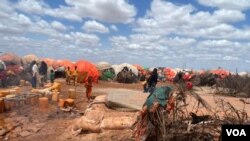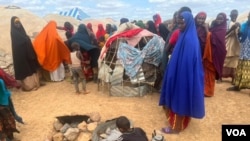Somali authorities say a record drought has created near-famine conditions in South West state. New arrivals at relief camps say they are eating animal skins to survive.
Baidoa, the administrative capital of Somalia’s South West state, is one of the worst drought-affected areas in the country. People who have lost their livelihoods due to drought arrive at relief camps every day in search of humanitarian assistance.
Sumadle, a new camp on the outskirts of Baidoa, hosts hundreds of new arrivals, mostly from the marginalized Eyle community.
Some of the Eyle walk over 150 kilometers to Sumadle after losing their livestock and harvests because of three consecutive seasons of no rain.
Iisho Mad Keer Madey, a young and pregnant mother of four, told VOA she took a difficult journey to arrive at the camp from Hawal-Barbar, in Bay region.
Madey said she and her children walked for two days and two nights to arrive at camp. She said people helped the exhausted family with a ride in an auto-rickshaw. She migrated after losing 20 goats and 20 camels because of drought, forcing her to beg to feed her children.
Habibo Ibrahim Haydar, the administrator of the camp, said the camp houses more than 300 new arrivals who have nothing to eat, and some have started to eat animal skins because they have not received humanitarian aid so far.
Two and half kilometers away there is another relief camp. Mercy Corps, an American humanitarian group, is providing the people there with water and cash to live in the camp, but it is not enough.
Mukhtar Haji Abukar, 73, arrived at the camp three days ago from the Bakol region. He told VOA he lost everything because of the drought.
Abukar said he had 60 cattle before the drought and now the only thing remaining is the animal skin he was sitting on. He said he and his family hadn’t cooked anything today or last night. It took him four days and four nights to get here from Bakol.
Abukar said this drought is the worst he has seen in his entire life.
In a trip for journalists arranged by Mercy Corps CEO Tjada D’Oyen McKenna said the situation in Somalia is dire and “beyond comprehension.”
"I met two women who had lost babies along the way and had to bury them on the roads as part of their journey,” she said. “We at Mercy Corps are providing cash to vulnerable families to buy food and other essentials and also providing water and hygiene kits to prevent disease spread.”
Somalia is witnessing one of the worst droughts in recent history. More than 1 million people have already been displaced by the drought, according to the United Nations.
The U.N. said more than 7.7 million Somalis—nearly half of the country’s population - need humanitarian assistance because of the drought.
UNICEF earlier told VOA that drought-related malnutrition has already killed 500 children in Somalia.





